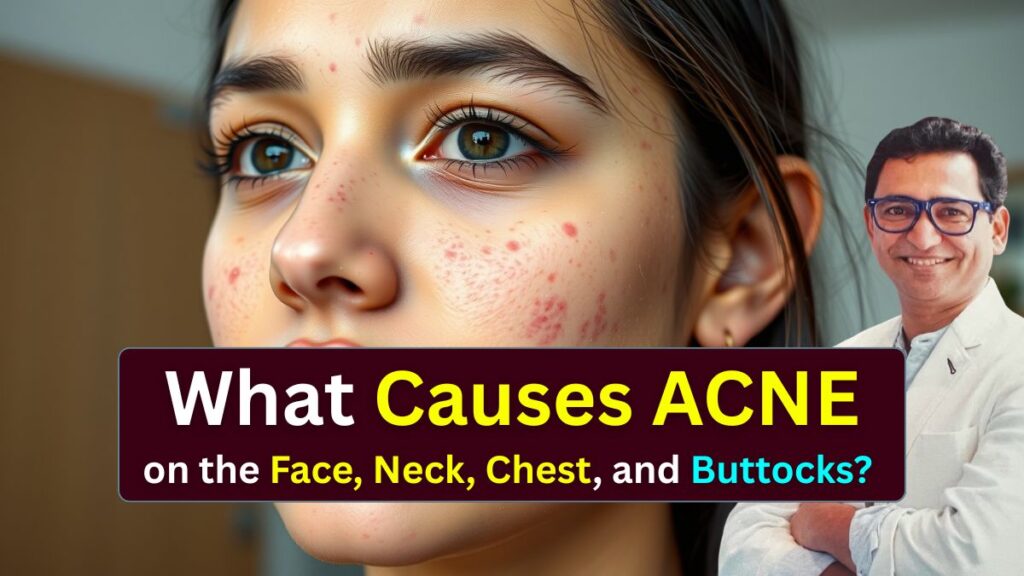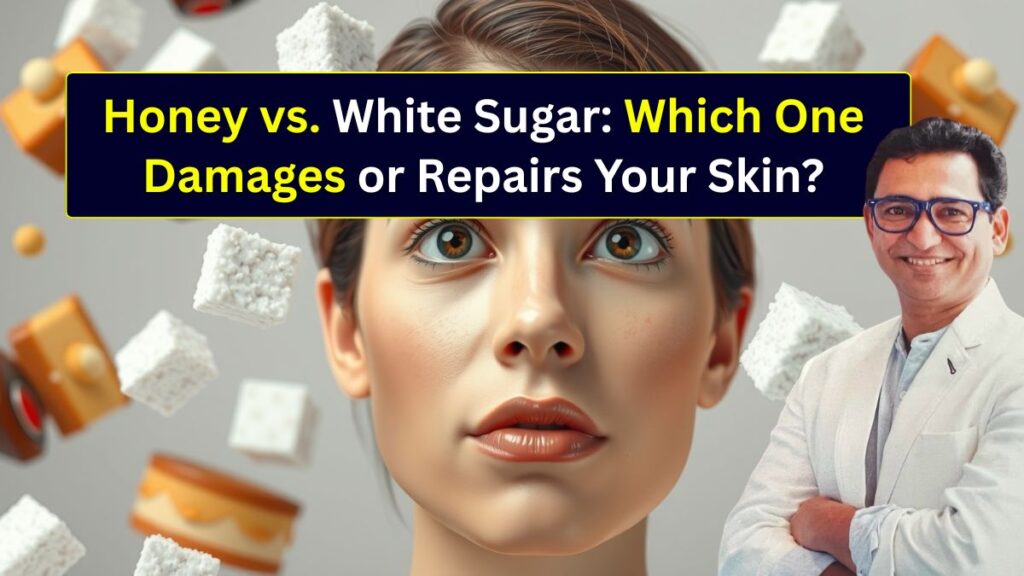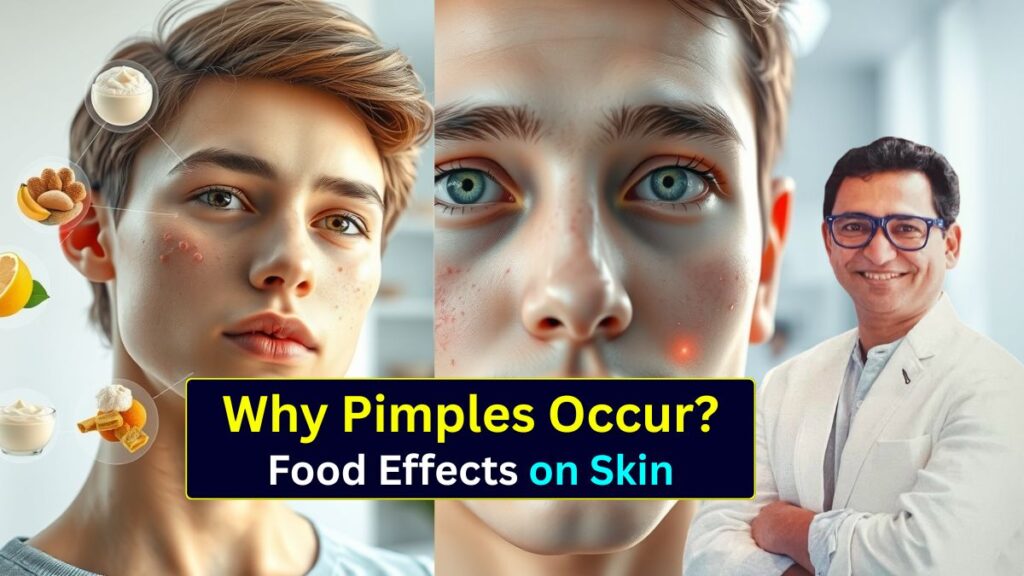What Causes Acne on the Face? Known from the Best Acne Doctor in Indore

Why Do We Get Acne on Different Body Parts? Known from the Best Acne Doctor in Indore Acne is one of the most common skin problems in India, affecting teenagers, young adults, and even people in their 30s and 40s. Due to changing lifestyles, food habits, pollution, and stress, acne cases are rising rapidly in urban as well as semi-urban areas. According to Dr. Atul Kathed, a trusted skin specialist from Indore, understanding the real causes of acne is the first step toward long-term skin health. In this article, we explain acne in simple language for public awareness, based on Indian skin types and daily habits, as explained by the best acne doctor in Indore. What Are the Main Reasons for the Increase in Acne in India? The number of acne patients in India has increased due to multiple modern lifestyle factors. High consumption of oily, spicy, and junk food, excessive intake of sugary drinks, irregular sleep, and constant stress disturb hormonal balance. Pollution and dust clog skin pores, while overuse of cosmetic products blocks oil glands. The best acne specialist in Indore often observes that self-medication and skin care trends popular on social media make acne worse instead of curing it. What Causes Acne on the Face? Facial acne mainly develops when oil (sebum), dead skin cells, and bacteria block the pores. Hormonal changes during puberty, menstrual cycles, or stress increase oil production. Touching the face frequently, using unclean mobile phones, and applying heavy makeup are common Indian habits that trigger acne. As advised by the best acne specialist in Indore, proper cleansing and medical guidance are more effective than just home remedies. Why Are There More Acne on Oily Skin? People with oily skin naturally produce more sebum, which easily clogs pores. In hot and humid Indian weather, sweat mixes with oil, creating the perfect environment for acne-causing bacteria. This is why oily skin individuals often experience frequent breakouts. The best acne specialist in Indore recommends adopting an oil control routine suited for Indian skin instead of harsh face washes, as harsh face washes damage the protective layer of the skin. Why Do Boys Have More Acne on Their Faces? Boys generally experience more acne due to higher testosterone levels, which stimulate oil glands. Excessive sweating, outdoor activities, and delayed skincare habits also play a role. Shaving with unclean razors or poor shaving techniques can further irritate the skin. According to the best acne specialist in Indore, early treatment can prevent acne scarring that usually affects young men. What Causes Acne on the Neck? Neck acne is often caused by friction, sweat, and clogged pores. Tight collars, scarves, helmet straps, and long hair touching the neck trap oil and bacteria. In India, humid climate and poor air circulation worsen the problem. The best acne doctor in Indore, Dr. Atul Kathed recommends wearing breathable clothes and regularly cleaning the areas affected by sweat. Why Do We Get Acne on the Chest? Chest acne occurs due to excessive sweating, tight synthetic clothes, and improper hygiene. Gym workouts without showering immediately, or using heavy body lotions, can clog chest pores. Many people ignore chest acne until it becomes painful. The best acne doctor in Indore emphasizes treating body acne with the same seriousness as facial acne. Why Do We Get Acne on the Buttocks? Buttock acne is common but rarely discussed openly. It is usually caused by prolonged sitting, tight jeans, poor ventilation, and bacterial growth. Though not always true acne, these bumps need proper diagnosis. As advised by the best acne doctor in Indore, avoiding friction and maintaining hygiene helps prevent recurrence. When Do Acne Go Away on the Face? Acne duration varies from person to person. Mild acne may settle within weeks, while hormonal or cystic acne can last for years without treatment. Many people wait for acne to “go away on its own,” which often leads to scars. The best acne doctor in Indore strongly recommends early medical intervention for faster and safer results. Why Does Acne Cause Black Spots on the Face? Black spots after acne are known as post-inflammatory hyperpigmentation. When acne heals, it leaves behind excess melanin, especially in Indian skin tones. Picking or squeezing pimples increases these marks. The best acne doctor in Indore explains that proper treatment not only clears acne but also reduces long-term pigmentation. Final Thoughts Acne is not just a cosmetic issue—it affects confidence, mental health, and quality of life. With rising cases across India, awareness and expert care are essential. Instead of experimenting with random products, consulting the best acne doctor in Indore, like Dr. Atul Kathed, ensures accurate diagnosis and personalized treatment.
Best Makeup for Every Skin Type: Expert Advice from Dermatologist Dr. Atul Kathed

Finding the perfect foundation or concealer can often feel like a high-stakes guessing game. Will it settle into fine lines? Will it cause a breakout by midday? Will it leave dry patches looking flaky? The truth is, there is no one-size-fits-all answer. The best makeup for every skin type depends on understanding your unique skin’s needs and choosing products that work with your complexion, not against it. We sat down with renowned dermatologist Dr. Atul Kathed to get his professional take on how to navigate the crowded beauty aisles. Whether your skin is oily, dry, sensitive, or mature, Dr. Kathed breaks down exactly what to look for—and what to avoid—to achieve a flawless, healthy-looking finish. Decoding the Label: What to Look For According to Dr. Kathed, the journey to great makeup starts long before the brush hits your face. “The best makeup for every skin shares one common trait: it supports the skin barrier,” he explains. This means looking for formulas that are non-comedogenic (won’t clog pores), fragrance-free, and packed with beneficial ingredients . “Think of your makeup as the final step in your skincare routine,” Dr. Kathed advises. “Ingredients like hyaluronic acid for hydration, niacinamide for calming inflammation and controlling oil, and ceramides for barrier repair are gold stars on any ingredient list”. 1. The Best Makeup for Acne-Prone Skin For those dealing with breakouts, the priority is coverage without congestion. “Acne-prone individuals should strictly avoid ingredients that can trap bacteria and oil,” warns Dr. Kathed. He suggests steering clear of heavy oils, silicones, and mica, which can exacerbate existing issues . Instead, look for oil-free, mineral-based powders or liquid foundations that contain salicylic acid or niacinamide. These ingredients help to clear pores while providing coverage . “The best makeup for every skin with acne concerns is one that feels lightweight and allows the skin to breathe,” he adds, recommending products labeled “non-acnegenic”. 2. Makeup Tips for Mature and Aging Skin As skin ages, it naturally loses volume and elasticity, changing how makeup sits on the surface. Dr. Kathed notes that the best makeup for every skin that is mature focuses on hydration and reflection rather than matte coverage. “A common mistake is using heavy powder, which settles into fine lines and wrinkles, making them more noticeable,” Dr. Kathed says . He recommends switching to liquid or cream foundations that contain plumping ingredients like hyaluronic acid and peptides . “These formulas reflect light and create a smoother, more youthful finish,” he explains. For the lips, he advises ditching matte lipsticks for hydrating glosses or sheer lipsticks to avoid a bleeding or smeared look. 3. How to Choose Makeup for Dry Skin Dry skin requires a nutrient-rich diet. The best makeup for every skin that leans dry is one that is deeply hydrating. Dermatologist Dr. Atul Kathed suggests looking for liquid or cream-based foundations that contain oils or hyaluronic acid . “Preparation is key,” he emphasizes. “Never apply makeup to dehydrated skin. Use a rich moisturizer or a facial oil before your foundation.” He also advises skipping powder wherever possible, as it can cling to dry patches and cause flaking. If you need to set your makeup, a hydrating setting spray is a much better option than a dusting of powder. 4. The Best Makeup for Oily Skin For oily skin, the goal is to control shine without stripping the skin of its natural moisture, which can actually cause it to produce more oil. Dr. Kathed states that the best makeup for every skin with oiliness is typically matte or “soft-matte” finish formulas. “Look for oil-free, water-based foundations that contain ingredients like silica or kaolin clay, which help absorb excess sebum,” he recommends . Primers are also essential here. A mattifying primer applied to the T-zone (forehead, nose, and chin) creates a barrier that prevents foundation from breaking down or sliding off throughout the day. 5. Best Makeup for Combination Skin Combination skin presents a unique challenge: an oily T-zone paired with dry or normal cheeks. “You don’t have to use the same product all over your face,” Dr. Kathed reveals. “The best makeup for every skin type, especially combination skin, involves a strategic approach.” He suggests using a mattifying primer or a matte foundation specifically on the oily areas of the face, and a more hydrating, dewy tint or cream on the cheeks . “This ‘zone-specific’ application ensures you’re treating both issues simultaneously.” He also recommends carrying blotting papers for midday touch-ups rather than adding more powder, which can make the dry areas look cakey. 6. How to Apply Makeup for Sensitive Skin For sensitive skin, the formula is everything. “If you have sensitive or reactive skin, the best makeup for every skin type is one with a short, simple ingredient list,” advises Dr. Kathed. “Avoid fragrances, alcohols, and essential oils, which are common irritants” . Mineral makeup is often a fantastic choice for sensitive skin, as it typically contains fewer preservatives and uses physical blockers like zinc oxide and titanium dioxide . Dr. Kathed also stresses the importance of patch-testing any new product on a small area of skin before applying it to your entire face. “And always, always double cleanse at night with a gentle oil cleanser followed by a mild, water-based cleanser to ensure every trace of makeup is removed without stripping the skin”. What Makeup Is Suitable for Fair Skin? While “fair skin” isn’t a skin type, it is a concern regarding shade matching. Skin Specialist Dr. Atul Kathed notes that the best makeup for every skin type regardless of color is one that matches your neck, not your hand. For very fair skin, he warns against foundations that lean too yellow or too orange. “Look for neutral or cool undertones. Many mineral brands offer excellent shade ranges specifically designed for fair complexions that won’t oxidize and change color throughout the day”. Final Thoughts from Dr. Atul Kathed Ultimately, the best makeup for every skin is one that makes you feel confident while simultaneously caring for your skin’s long-term health. By choosing products with beneficial ingredients and tailoring your application technique to your specific needs, you can ensure your makeup routine is a form
Why Does Your Skin Look Dull? Know from Skin Specialist Dr. Atul Kathed

Have you ever noticed that just before an important office meeting or a special family function, your skin suddenly loses its glow? Many people wonder why their skin look dull even when they are using good skincare products. According to Dr. Atul Kathed, dull skin is rarely just a surface-level problem. In most cases, it is your body’s way of communicating that something deeper needs attention. Dull Skin Is a Signal, Not a Failure One common misconception is that skincare products alone can fix everything. When people complain that their skin look dull, they often blame pollution, stress, or cosmetics. While these factors do play a role, Dr. Atul Kathed explains that skin does not fail you randomly. Instead, it reflects internal imbalances and lifestyle habits that are often ignored. Your skin is a living organ that responds to what you eat, how you sleep, how active you are, and how well your internal systems are functioning. If these systems are disturbed, your skin is usually the first place where signs appear. The Gut–Skin Connection You Should Not Ignore One of the most overlooked reasons why skin look dull is poor gut health. Issues such as gut inflammation, bloating, acidity, and irregular digestion directly impact nutrient absorption. When your body is not absorbing vitamins, minerals, and antioxidants properly, your skin does not receive what it needs to repair and regenerate. Even if you apply expensive creams, dullness can persist if your gut health is compromised. A balanced diet rich in fiber, probiotics, and hydration plays a key role in restoring natural skin brightness from within. Hormonal Changes and Their Impact on Skin Glow Hormones have a powerful influence on skin texture and tone. Fluctuations related to stress, menstrual cycles, thyroid imbalance, or lifestyle changes can easily make your skin look dull. Hormonal imbalance may slow down cell turnover, reduce collagen production, and affect oil balance, all of which contribute to a tired and lifeless appearance. Managing stress, following a routine, and seeking medical guidance when symptoms persist can help bring hormones back into balance and improve overall skin quality. Lifestyle Habits That Steal Your Skin’s Radiance Modern lifestyles are often a major reason behind dull-looking skin. Irregular meal timings, excessive junk food, lack of physical activity, and prolonged screen time disrupt the body’s natural rhythm. When these habits continue, it is common to notice that your skin look dull despite using multiple skincare products. Regular exercise improves blood circulation, which helps deliver oxygen and nutrients to skin cells. This natural boost supports healthy skin regeneration and a visible glow. Sleep and Circadian Rhythm Matter More Than You Think Sleep is not just rest; it is repair time for your body and skin. Poor sleep quality or late-night routines disturb the circadian rhythm, which controls hormone release and cell repair. When sleep is inadequate, toxins accumulate, inflammation increases, and skin renewal slows down. This is why people who do not sleep on time often complain that their skin look dull and tired. Consistent sleep patterns and 7–8 hours of quality rest can significantly improve skin clarity and freshness. Eating Right Is as Important as What You Apply What you eat and how you eat matters just as much as your skincare routine. Skipping meals, overeating, or consuming highly processed foods can lead to inflammation and nutritional deficiencies. Over time, these habits reflect on the skin, making it appear uneven and lifeless. Hydration is another key factor. Dehydration reduces skin elasticity and glow, making the skin look dull and rough. Drinking enough water and including fruits, vegetables, and healthy fats in your diet can support long-term skin health. Stop Looking at Skin in Isolation A major mistake many people make is treating skin as a separate entity. Skin Specialist Dr. Atul Kathed emphasizes that if you look at skin in isolation and ignore overall health, achieving long-lasting glow is difficult. When internal health is weak, no topical solution can fully compensate for it. Healthy skin is a mirror of healthy living. When your digestion, hormones, sleep, and lifestyle are balanced, your skin naturally reflects that balance. The Real Secret to Naturally Glowing Skin If your skin look dull, the solution is not always a new product or treatment. It often begins with understanding your body’s signals and making small but consistent changes in daily life. Improving gut health, managing stress, exercising regularly, sleeping on time, and eating mindfully can transform skin from within. In simple words, good health shows on your skin, and poor health does too. When you take care of your body as a whole, your skin does not need to struggle to look healthy—it simply does.
Is Sugar Good for Skin? Here’s How It Affects Acne, Aging & Elasticity

Is Sugar Good for Skin? Effects Explained by Skin Specialist in Indore Dr. Atul Kathed Many people often ask, is sugar good for skin? While sugar provides quick energy to the body, its effect on skin health is mostly negative when consumed in excess. Refined sugar weakens collagen, increases inflammation, and triggers hormonal changes that lead to acne and early aging. According to Dr. Atul Kathed, understanding is sugar good for skin or not is important because diet plays a major role in long-term skin quality. Occasional sugar intake may not harm you, but regular consumption can silently damage your skin from within. In simple terms: If you’re wondering is sugar good for skin?, the answer is no—especially when consumed frequently or in processed forms. Is Sugar Good for Skin or Not? Understanding the Truth To clearly understand is sugar good for skin or not, you need to look at how sugar behaves inside the body. High sugar intake leads to glycation, a process that damages collagen and elastin, making skin lose firmness and elasticity. This explains why people who consume sugary foods daily often experience: So when patients ask is sugar good for skin health, dermatologists usually recommend limiting sugar to protect skin structure and glow. Is Sugar Good for Skin in Any Way? You might still wonder, is sugar good for skin in any situation? Sugar itself does not directly improve skin. However, natural sugars found in fruits come with fiber, antioxidants, and vitamins that support skin repair. The benefit comes from the nutrients, not the sugar alone. That’s why whole fruits are healthier than desserts or sugary drinks. So, if you are asking is sugar good for skin? naturally, the answer depends on the source and quantity. Is Sugar Good for Skin vs Sugar Disadvantages for Skin When comparing is sugar good for skin versus its disadvantages, the harmful effects clearly outweigh the benefits. Sugar Disadvantages for Skin: This is why dermatologists strongly advise reducing sugar intake for clearer, healthier skin. Can You Reverse Sugar Damage to Skin? People who ask is sugar good for skin often also want to know if damage can be reversed. The good news is that skin can recover once sugar intake is reduced. By cutting down sugar and following a balanced diet: Within a few weeks, many individuals notice visible improvement in their skin’s texture and brightness. Face Before and After Quitting Sugar – Skin Changes Explained If you’re still questioning is sugar good for skin, the before-and-after results of quitting sugar tell the story clearly. Before reducing sugar: After reducing sugar: These changes highlight why sugar control is essential for healthy skin. Is Honey or Natural Sugar Good for Skin? Another common question is is sugar good for skin? when it comes from honey or jaggery? While these are better alternatives, they still affect blood sugar levels. Moderation remains key. Even natural sugars can cause skin issues if consumed in excess. Final Verdict: Is Sugar Good for Skin? So, is sugar good for skin? The honest answer is no when consumed in large amounts. Reducing sugar is one of the easiest lifestyle changes you can make to improve skin health, slow aging, and reduce acne. As emphasized by Dr. Atul Kathed, combining a low-sugar diet with proper skincare leads to long-term skin clarity and glow.
ज्यादा पसीना आना हाइपरहाइड्रोसिस: कारण, उपचार से जुड़ी पूरी जानकारी

हाथ पैरों में पसीना हाइपरहाइड्रोसिस क्या है, यह क्यों होता है? कारण, उपचार से जुड़ी पूरी जानकारी। हमारे शरीर का पसीना आना एक सामान्य प्रक्रिया है, जो शरीर का तापमान नियंत्रित करने में मदद करती है। लेकिन जब बिना मेहनत, बिना गर्मी या बिना किसी कारण के अत्यधिक पसीना आने लगे, तो यह समस्या हाइपरहाइड्रोसिस कहलाती है। खासकर हाथ पैरों में पसीना हाइपरहाइड्रोसिस लोगों के आत्मविश्वास, सामाजिक जीवन और मानसिक स्वास्थ्य को गहराई से प्रभावित करता है। यह लेख जागरूकता के उद्देश्य से लिखा गया है, ताकि लोग इस बीमारी को समझें और सही समय पर इलाज करवा सकें। हाइपरहाइड्रोसिस क्या है? हाइपरहाइड्रोसिस एक ऐसी स्थिति है जिसमें शरीर की पसीना ग्रंथियां जरूरत से ज्यादा सक्रिय हो जाती हैं। इसके कारण हथेलियों, तलवों, बगल, चेहरे और सिर पर अत्यधिक पसीना आने लगता है। कई मरीजों में हाथ पैरों में पसीना हाइपरहाइड्रोसिस इतना ज्यादा होता है कि रोजमर्रा के काम करना भी मुश्किल हो जाता है। हाइपरहाइड्रोसिस बीमारी से कैसे बचें? पूरी तरह बचाव संभव नहीं है, लेकिन कुछ आदतें अपनाकर इसकी तीव्रता को कम किया जा सकता है: शुरुआती स्तर पर सावधानी रखने से हाथ पैरों में ज़्यादा पसीना (हाइपरहाइड्रोसिस) को बढ़ने से रोका जा सकता है। हाइपरहाइड्रोसिस चेहरे को कैसे प्रभावित करता है? जब चेहरे पर अत्यधिक पसीना आता है, तो मेकअप टिकता नहीं, त्वचा पर जलन, रैशेज और संक्रमण का खतरा बढ़ जाता है। कई लोग सार्वजनिक स्थानों पर बोलने या मिलने-जुलने से कतराने लगते हैं। चेहरे के साथ अगर हाथ पैरों में ज़्यादा पसीना (हाइपरहाइड्रोसिस) भी हो, तो समस्या और गंभीर हो जाती है। किस विटामिन की कमी से हाइपरहाइड्रोसिस होता है? सीधे तौर पर किसी एक विटामिन की कमी को हाइपरहाइड्रोसिस का कारण नहीं माना जाता, लेकिन: नर्वस सिस्टम को प्रभावित कर सकती है, जिससे पसीना ज्यादा आ सकता है। इसलिए संतुलित आहार बहुत जरूरी है, खासकर उन लोगों के लिए जिन्हें हाथ पैरों में पसीना (हाइपरहाइड्रोसिस) की समस्या है। स्कूल में बच्चों को हाइपरहाइड्रोसिस ज्यादा क्यों होती है? बच्चों में यह समस्या अक्सर इन कारणों से देखी जाती है: कई बच्चों में हाथ पैरों में अत्यधिक पसीना (हाइपरहाइड्रोसिस) होने से कॉपी गीली हो जाती है, पेन पकड़ने में दिक्कत होती है और आत्मविश्वास कम हो जाता है। क्या हाइपरहाइड्रोसिस बीमारी जेनेटिक है? हाँ, कई मामलों में यह बीमारी जेनेटिक हो सकती है। अगर परिवार में किसी को पहले से यह समस्या रही है, तो अगली पीढ़ी में भी इसके लक्षण दिख सकते हैं। ऐसे मामलों में हाथ पैरों में ज्यादा पसीना आना (हाइपरहाइड्रोसिस) किशोरावस्था से ही शुरू हो जाता है। क्या ठंडा खाने से हाइपरहाइड्रोसिस ठीक हो सकता है? ठंडा खाना पसीने को अस्थायी रूप से कम कर सकता है, लेकिन इससे बीमारी ठीक नहीं होती। बहुत ज्यादा ठंडा खाना पाचन को बिगाड़ सकता है। इसलिए इलाज के बजाय खान-पान को सहायक उपाय के रूप में ही देखें, खासकर जब समस्या हाथ पैरों में पसीना हाइपरहाइड्रोसिस से जुड़ी हो। क्या गर्म खाने से हाइपरहाइड्रोसिस होता है? हाँ, बहुत ज्यादा मसालेदार और गर्म भोजन पसीना बढ़ा सकता है। यह बीमारी की जड़ नहीं है, लेकिन लक्षणों को जरूर बढ़ाता है। ऐसे लोगों को संतुलित और हल्का भोजन लेने की सलाह दी जाती है। हाइपरहाइड्रोसिस का सही इलाज क्या है? हाइपरहाइड्रोसिस का इलाज उसकी गंभीरता पर निर्भर करता है: hyperhidrosis doctor in indore, Dr. Atul Kathed के अनुसार, सही जांच के बाद इलाज कराने से हाथ पैरों में पसीना (हाइपरहाइड्रोसिस) को काफी हद तक नियंत्रित किया जा सकता है। निष्कर्ष हाइपरहाइड्रोसिस कोई छोटी समस्या नहीं है, बल्कि यह व्यक्ति के आत्मसम्मान और जीवन की गुणवत्ता को प्रभावित करती है। सही जानकारी, समय पर इलाज और विशेषज्ञ सलाह से इस बीमारी को नियंत्रित किया जा सकता है। अगर आप या आपके बच्चे हाथ पैरों में पसीना (हाइपरहाइड्रोसिस) की समस्या से जूझ रहे हैं, तो इसे नजरअंदाज न करें और त्वचा विशेषज्ञ से परामर्श जरूर लें।
What Is Mitochondria and Why Is It Important to Cell Function and Human Health?

In today’s fast-paced lifestyle, people often talk about low energy, weak immunity, premature aging, and poor skin health. While these issues may seem external, their roots often lie deep inside the body—at the cellular level. One of the most important contributors to overall wellness is the mitochondria. Understanding mitochondria and human health is essential for public awareness, as these tiny structures influence how our body functions, repairs itself, and stays energized. According to Dermatologist Dr. Atul Kathed, good health and healthy skin begin at the cellular level, and mitochondria play a key role in keeping cells active and balanced. What Is Mitochondria? Mitochondria are small structures found inside almost every cell of the human body. They are commonly known as the powerhouse of the cell because they generate the energy required for survival. Every movement we make, every breath we take, and even skin renewal depends on energy produced by mitochondria. The connection between mitochondria and human health is strong because cells with healthy mitochondria function efficiently, while damaged mitochondria lead to tired, weak, or aging cells. What Is the Function of Mitochondria? The main function of mitochondria is to convert the food we eat into energy in the form of ATP (adenosine triphosphate). This energy fuels essential processes such as digestion, muscle contraction, brain activity, immunity, and skin repair. Beyond energy production, mitochondria also help regulate metabolism, control inflammation, and manage cell survival. This explains why mitochondria and human health are closely linked to both internal wellness and external appearance. What Is the Role of Mitochondria in the Cell? The role of mitochondria in the cell goes beyond just supplying energy. They act as decision-makers for cell growth, repair, and programmed cell death. Healthy mitochondria help cells adapt to stress, while poorly functioning mitochondria can damage the entire cell. Dr. Atul Kathed explains that skin cells depend heavily on mitochondrial energy for collagen production, healing, and maintaining glow. When mitochondrial function declines, it can reflect on the skin as dullness, fine lines, and delayed recovery. Why Are Mitochondria Important for Our Bodies? The importance of mitochondria lies in the fact that every organ in the body depends on them. Organs like the heart, brain, muscles, and skin require high energy and therefore contain a large number of mitochondria. Poor mitochondrial performance is associated with fatigue, reduced immunity, slow healing, and accelerated aging. This is why awareness about mitochondria and human health is important for people of all age groups, not just those with medical conditions. What Can Be Consumed to Support Mitochondrial Health? While mitochondria cannot be instantly replaced, mitochondrial health can be supported through proper nutrition and lifestyle habits. A balanced diet rich in antioxidants helps protect mitochondria from damage. Foods that support mitochondria include: Nutrients such as B-vitamins, magnesium, omega-3 fatty acids, and coenzyme Q10 help improve mitochondrial efficiency. Dr. Atul Kathed emphasizes that good nutrition and hydration directly impact mitochondria and human health, which in turn reflects on skin quality and overall vitality. What Simple Sugars Are Broken Down in Mitochondria? Mitochondria play a major role in breaking down glucose, a simple sugar derived from carbohydrates. Through cellular respiration, glucose is converted into ATP, providing energy for daily activities. However, excessive sugar intake can overload this system, reducing efficiency and harming mitochondrial health. Balanced sugar consumption supports better energy levels and improves long-term mitochondria and human health. Common Google Questions About Mitochondria Are mitochondria found in all cells?Mitochondria are present in most human cells, except red blood cells. Does aging affect mitochondria?Yes, mitochondrial efficiency decreases with age, making lifestyle choices more important. Can exercise improve mitochondrial function?Regular physical activity helps the body create new mitochondria, strengthening mitochondria and human health. Final Thoughts Mitochondria may be microscopic, but their role in human life is enormous. From energy production to skin regeneration, immunity, and aging, they influence nearly every function of the body. Understanding mitochondria and human health helps people realize that wellness begins inside the cell. As Dr. Atul Kathed often shares, caring for your body at the cellular level leads to healthier skin, better energy, and improved overall well-being. By maintaining good nutrition, staying active, and managing stress, we can protect our mitochondria and support long-term health—naturally and effectively.
Why Do Pimples Occur? Effects of Sour Food, Curd, and Sugar on Skin – Learn from Dr. Atul Kathed

Pimples are one of the most common skin problems affecting teenagers and adults alike. Many people notice that their breakouts increase after eating certain foods like sour items, curd, or sweets, which leads to confusion and myths about diet and skin health. According to Skin Specialist Dr. Atul Kathed, pimples are not caused by food alone, but diet can definitely influence how your skin behaves, especially if you already have oily or acne-prone skin. Understanding why pimples occur and how daily food habits affect your skin can help you make better lifestyle choices and prevent recurring breakouts. Why Do Pimples Occur? Pimples develop when pores get blocked due to excess oil (sebum), dead skin cells, and bacteria. Hormonal changes, stress, improper skincare, and diet all play supporting roles. As explained by Skin Specialist Dr. Atul Kathed, pimples usually appear when oil glands become overactive, leading to inflammation and bacterial growth under the skin. Factors such as lack of sleep, frequent touching of the face, and using unsuitable skincare products can worsen the condition. Why Does Eating Sour Food Cause Pimples on the Face? Sour foods like pickles, tamarind, vinegar, and citrus fruits are acidic in nature. When consumed in excess, they may disturb digestion and increase heat in the body. Poor digestion can reflect on the skin in the form of pimples, especially around the mouth and chin area. According to Skin Specialist Dr. Atul Kathed, sour food does not directly cause pimples, but overeating it may trigger inflammation and oil imbalance in people who are already prone to acne. Why Does Eating Curd Cause Pimples? Curd is considered healthy, but it may not suit everyone’s skin. Dairy products can influence insulin and hormone levels, which may increase oil production. Some people experience breakouts after consuming curd, especially at night or during humid weather. As per Skin Specialist Dr. Atul Kathed, people with sensitive or acne-prone skin should observe how their skin reacts to curd and limit intake if they notice frequent breakouts. Does Eating Sweets Harm the Face? Sugary foods such as chocolates, cakes, and soft drinks can spike blood sugar levels. This increases insulin production, which can stimulate oil glands and worsen pimples. Excess sugar also promotes inflammation, making existing acne more severe. Skin Specialist Dr. Atul Kathed advises reducing refined sugar intake and choosing natural alternatives like fruits to maintain clearer and healthier skin. What Is the Difference Between Pimples and Acne? Many people use pimples and acne interchangeably, but they are not exactly the same. Pimples are occasional breakouts that appear due to clogged pores and usually heal quickly. Acne, on the other hand, is a chronic skin condition that includes blackheads, whiteheads, cysts, and painful nodules. Acne often leaves scars if not treated properly. According to Skin Specialist Dr. Atul Kathed, persistent or painful breakouts should not be ignored, as early treatment can prevent long-term skin damage. Deficiency of Which Vitamin Causes Pimples and Acne? Vitamin deficiencies can also impact skin health. Lack of Vitamin A may lead to excessive oil production, while Vitamin B12 imbalance has been linked to acne flare-ups. Vitamin D deficiency can weaken skin immunity, making it more prone to infections and inflammation. Skin Specialist Dr. Atul Kathed emphasizes maintaining a balanced diet rich in vitamins, minerals, and antioxidants to support healthy skin from within. Frequently Asked Questions About Pimples and Diet Can food alone cause pimples?No, food alone does not cause pimples. It acts as a trigger along with hormones, skincare habits, and genetics. Should I stop eating sour food completely?No, moderation is key. Avoid excessive consumption and maintain good digestion. Is oily skin more prone to pimples?Yes, oily skin produces more sebum, which can clog pores and lead to breakouts. When should I consult a dermatologist?If pimples are painful, recurring, or leaving marks, professional treatment is recommended. Final Thoughts Pimples are a result of multiple internal and external factors. While foods like sour items, curd, and sweets can influence breakouts, they are not the sole cause. Healthy eating, proper skincare, and timely medical advice play a crucial role in achieving clear skin. If you are struggling with frequent pimples or acne, consulting an experienced dermatologist like Skin Specialist Dr. Atul Kathed can help you identify the root cause and get personalized treatment for long-term skin health.
क्या धूप से डरना सही है? Dermatologist Dr. Atul Kathed से जानिए धूप की सच्चाई

आज के समय में धूप से डरना कितना सही और कितना गलत है इस बारे में लोगो के मन काफी भ्रम है। एक तरफ कुछ लोग कहते हैं कि धूप से त्वचा खराब हो जाती है, झाइयाँ और टैनिंग हो जाती है, वहीं दूसरी तरफ कुछ त्वचा विशेषज्ञ धूप में जाने की सलाह देते हैं। इसी कारण बहुत से लोग Dermatologist Dr. Atul Kathed से यह सवाल बार-बार पूछते हैं कि जब दूसरे डॉक्टर धूप से बचने को कहते हैं, तो आप क्या धूप से डरना सही है? इस सवाल का जवाब केवल त्वचा तक सीमित नहीं है, बल्कि यह हमारे पूरे शरीर और आज की जीवनशैली से जुड़ा हुआ है। आज की इंडोर लाइफस्टाइल और धूप की कमी Dr. Atul Kathed के अनुसार, आजकल हमारी ज़िंदगी पूरी तरह इंडोर हो गई है। पहले लोग धूप से डरना को न कह कर बाहर निकल जाते थे, पैदल चलते थे और स्वाभाविक रूप से सूरज की रोशनी उनके शरीर को मिलती थी। लेकिन आज अधिकतर लोग सुबह से शाम तक घर या ऑफिस के अंदर रहते हैं। ऑफिस में काम करते समय हम प्राकृतिक रोशनी के बजाय LED लाइट और वॉर्म लाइट का उपयोग करते हैं। इन कृत्रिम रोशनीयों में सूरज की तरह प्राकृतिक स्पेक्ट्रम नहीं होता, खासकर रेड लाइट एलिमेंट लगभग गायब होता है। इसका सीधा असर हमारे शरीर की कोशिकाओं पर पड़ता है। रेड लाइट और माइटोकॉन्ड्रिया का संबंध हमारे शरीर की हर कोशिका में माइटोकॉन्ड्रिया (Mitochondria) मौजूद होता है, जिसे कोशिका का पावरहाउस कहा जाता है। यह हमें ऊर्जा प्रदान करता है। जब शरीर को सूरज की रेड लाइट का पर्याप्त एक्सपोज़र नहीं मिलता, तो माइटोकॉन्ड्रिया जल्दी थकने लगता है। Dr. Atul Kathed बताते हैं कि माइटोकॉन्ड्रिया के कमजोर होने से शरीर में थकान बढ़ती है, त्वचा की चमक कम होती है और एजिंग की प्रक्रिया तेज़ हो जाती है। यही कारण है कि आज कम उम्र में ही लोग थके हुए, सुस्त और उम्र से बड़े दिखने लगते हैं। धूप और एजिंग का कनेक्शन अक्सर लोगों को लगता है कि धूप से एजिंग बढ़ती है, जबकि सच्चाई यह है कि सही समय और सही मात्रा में ली गई धूप एजिंग को धीमा करती है। सूरज की रोशनी शरीर में कई ज़रूरी प्रक्रियाओं को सक्रिय करती है, जो त्वचा और शरीर दोनों के लिए फायदेमंद हैं। Dr. Atul Kathed के अनुसार, धूप से पूरी तरह दूर रहना एक तरह से शरीर को प्राकृतिक ऊर्जा से वंचित करना है। धूप से मिलने वाले स्वास्थ्य लाभ यदि आप युवा बने रहना चाहते हैं, हड्डियों को मज़बूत रखना चाहते हैं, मेटाबॉलिज़्म को तेज़ रखना चाहते हैं और इम्युनिटी को बेहतर बनाना चाहते हैं, तो धूप बेहद ज़रूरी है। धूप के मुख्य फायदे: धूप में कैसे जाएँ? Dr. Atul Kathed की सलाह धूप में जाना मतलब यह नहीं कि घंटों तेज़ धूप में बिना सुरक्षा के खड़े रहें। Dr. Atul Kathed सलाह देते हैं कि: इस तरह संतुलित रूप से ली गई धूप शरीर के लिए अमृत के समान काम करती है। क्या धूप से डरना सही है? नहीं। Dermatologist Dr. Atul Kathed के अनुसार, धूप से डरना नहीं, बल्कि उसे समझना ज़रूरी है। गलत समय और अत्यधिक धूप नुकसान पहुँचा सकती है, लेकिन सही समय और सीमित मात्रा में ली गई धूप शरीर के लिए अत्यंत लाभकारी है। सूरज की धूप क्यों है सेहत के लिए ज़रूरी? सूरज की धूप शरीर को प्राकृतिक ऊर्जा देती है। यह न केवल त्वचा को, बल्कि हड्डियों, मांसपेशियों, इम्युनिटी और मानसिक स्वास्थ्य को भी बेहतर बनाती है। Dr. Atul Kathed मानते हैं कि धूप से दूरी बनाकर रखना लंबे समय में शरीर को कमजोर कर सकता है। धूप की कमी से शरीर पर क्या असर पड़ता है? धूप की कमी से शरीर में: जैसी समस्याएँ देखने को मिल सकती हैं। निष्कर्ष इंदौर के प्रसिद्ध त्वचा विशेषज्ञ Dr. Atul Kathed के अनुसार, धूप से डरना और पूरी तरह बचना सही नहीं है। आज की इंडोर जीवनशैली में धूप को सही तरीके से अपनाना बेहद ज़रूरी हो गया है। सही समय, सही मात्रा और सही समझ के साथ ली गई धूप आपको स्वस्थ, ऊर्जावान और युवा बनाए रखने में मदद करती है। अगर आप अपनी त्वचा और सेहत को लंबे समय तक बेहतर रखना चाहते हैं, तो धूप को दुश्मन नहीं, बल्कि एक प्राकृतिक मित्र की तरह अपनाइए। और कम से कम 15 से 20 मिनट तक धूप का सेवन जरूर करें।
Skin Serum: Myths vs Facts Explained by Dr. Atul Kathed

Skin serums have become an essential part of modern skincare routines, yet many people remain confused about their real benefits and proper usage. As a dermatologist, Dr. Atul Kathed often encounters patients who either overuse serums or avoid them due to common misconceptions. In this blog, Skin Serum Dermatologist Dr. Atul Kathed explains the myths versus facts about skin serums in a clear, practical, and science-backed way to help you make informed skincare choices. Unlike creams or lotions, serums are lightweight formulations designed to deliver active ingredients deep into the skin. According to Dermatologist in Indore Dr. Atul Kathed, understanding what a serum does and how it works is the key to achieving healthy, glowing skin without causing damage. What Do Serums Do for the Skin? Skin serums are concentrated skincare products packed with active ingredients such as vitamins, antioxidants, peptides, and hydrating agents. Their smaller molecular structure allows them to penetrate deeper into the skin compared to regular moisturizers. As explained by Skin Serum Dermatologist Dr. Atul Kathed, serums target specific skin concerns like dullness, dehydration, acne, pigmentation, and early signs of aging. They do not replace moisturizers; instead, they work underneath to improve skin function while creams lock in moisture and protect the skin barrier. Is It Okay to Apply Skin Serum in Winter? A common myth is that serums should only be used in summer. In reality, winter is one of the best times to use the right serum. Cold weather, low humidity, and indoor heating can strip moisture from the skin, making it dry and sensitive. According to Skin Serum Dermatologist Dr. Atul Kathed, hydrating serums containing hyaluronic acid, glycerin, or ceramides are extremely beneficial during winter. When followed by a good moisturizer, a serum helps maintain hydration and prevents flakiness, irritation, and tightness. Does Applying a Serum Benefit Aging Skin? Yes, serums play a major role in managing aging skin. With age, the skin’s ability to produce collagen and retain moisture decreases, leading to wrinkles, fine lines, and loss of firmness. Skin Serum Dermatologist Dr. Atul Kathed emphasizes that anti-aging serums containing retinol, peptides, vitamin C, and antioxidants can improve skin texture and elasticity over time. When used consistently and correctly, these serums support skin repair, boost collagen production, and slow visible signs of aging without being harsh. Is Skin Serum Used to Brighten the Skin? Many people believe that all serums are meant only for brightening, which is not entirely true. While not every serum is designed for glow, certain formulations do help improve skin brightness and tone. As per Skin Serum Dermatologist Dr. Atul Kathed, serums with vitamin C, niacinamide, alpha arbutin, or licorice extract help reduce dullness, pigmentation, and uneven skin tone. These ingredients work by improving cell turnover and reducing excess melanin production, resulting in a healthier, more radiant appearance over time. Which Oil-Based Serums Help Keep the Skin Hydrated? Oil-based serums are especially helpful for dry, mature, and dehydrated skin types. They work by sealing in moisture and strengthening the skin’s natural barrier. Skin Serum Dermatologist Dr. Atul Kathed recommends oil-based serums containing squalane, jojoba oil, rosehip oil, or argan oil. These oils closely mimic the skin’s natural lipids, making them effective without clogging pores when used correctly. They are best applied at night or during colder months for long-lasting hydration. Does Using Skin Serum for a Long Time Harm the Skin? This is one of the most common fears among skincare users. The fact is, using a suitable serum consistently does not harm the skin. Problems usually arise from incorrect product selection or overuse. According to Skin Serum Dermatologist Dr. Atul Kathed, long-term use of a dermatologist-recommended serum can actually improve skin health. However, using multiple active ingredients without guidance, applying too much product, or ignoring sunscreen can lead to irritation. The key is choosing the right serum for your skin type and concern. Final Thoughts Skin serums are powerful skincare allies when used wisely. They are not miracle products, but with the right formulation, consistency, and expert guidance, they can significantly improve skin health. Skin Serum Dermatologist Dr. Atul Kathed advises consulting a dermatologist before adding active serums to your routine, especially if you have sensitive or problem-prone skin. By understanding the facts and avoiding common myths, you can make skin serums work effectively and safely for long-term, visible results.
What Is Body Contouring Treatment? Benefits, Cost, and Best Dermatologist in Indore

In today’s fast-paced lifestyle, many people struggle with stubborn fat pockets or uneven body shape despite regular exercise and a balanced diet. This is where body contouring treatment plays an important role. As a dermatologist, I often meet patients who want to improve their body shape safely, without major surgery. Body contouring offers effective, medically guided solutions to reshape and refine the body with minimal downtime. I am Dr. Atul Kathed, a dermatologist in Indore, and in this article, I will help you understand what body contouring is, its benefits, costs, and how to choose the right specialist for the best results. What Is Body Contouring Treatment? Body contouring treatment refers to advanced medical procedures designed to improve body shape by reducing localized fat, tightening loose skin, and enhancing body proportions. These treatments target areas where fat is resistant to diet and exercise, such as the abdomen, thighs, arms, love handles, and double chin. Modern body contouring techniques are mostly non-surgical or minimally invasive. They work by breaking down fat cells, stimulating collagen production, and improving skin firmness. Over time, the body naturally eliminates the treated fat cells, leading to a more sculpted and toned appearance. It is important to understand that body contouring is not a weight-loss solution. Instead, it is ideal for individuals who are close to their desired weight but want better shape definition and smoother body contours. Body Contouring Treatment in Indore The demand for body contouring treatment in Indore has increased significantly due to growing awareness and access to advanced dermatological technology. Today, patients in Indore can benefit from globally accepted body contouring procedures performed under medical supervision. At my Dr. Atul Kathed Aesthetics Skin Clinic in Indore, body contouring treatments are customized based on: Each patient undergoes a detailed consultation before starting the treatment. This ensures safety, realistic expectations, and natural-looking results. With proper planning, body contouring can help enhance confidence and body image without disrupting daily life. Body Contouring Treatment Cost in Indore The body contouring treatment cost in Indore depends on several factors. There is no single fixed price, as the treatment plan is personalized for every patient. Common factors affecting the cost include: In Indore, the cost is generally more affordable compared to metro cities, while maintaining high medical standards. During consultation, I explain the complete cost structure clearly, so patients can make an informed decision without any confusion. What Are the Benefits of Body Contouring Treatments? Body contouring treatments offer both physical and psychological benefits. Some of the key advantages include: One major benefit of body contouring treatment is that once fat cells are destroyed and eliminated, they do not return. With a healthy lifestyle, the results can be long-lasting and satisfying. Best Dermatologist for Body Contouring Treatment in Indore Choosing the right specialist is crucial for safe and effective results. Body contouring should always be performed under the supervision of a qualified dermatologist who understands skin, fat layers, and body anatomy. As a dermatologist, I focus on: Being recognized as one of the trusted names for body contouring treatment in Indore, my goal is not just aesthetic improvement, but also patient satisfaction and confidence. Proper evaluation, realistic expectations, and expert execution make a significant difference in outcomes. Final Thoughts Body contouring is an excellent option for individuals who want to refine their body shape without undergoing surgery. With advancements in dermatology, these treatments are now safer, more effective, and more accessible than ever. If you are considering body contouring, consult an experienced dermatologist who can guide you based on your body goals and medical needs. With the right approach, body contouring treatment can help you achieve a more sculpted, confident version of yourself. – Dr. Atul Kathed, Dermatologist, Indore

